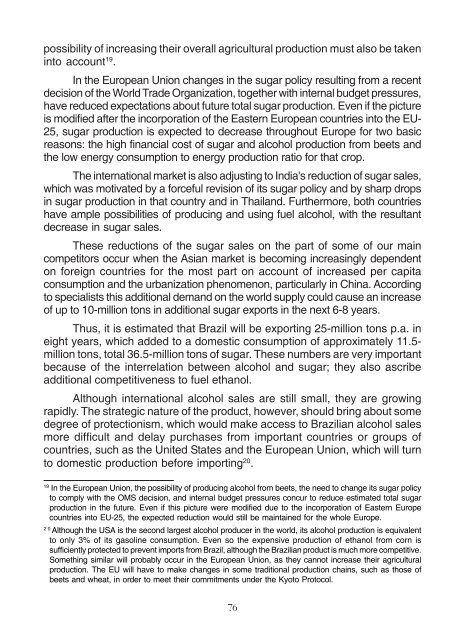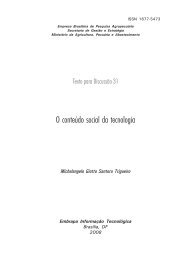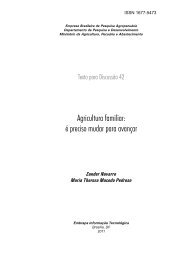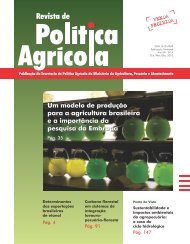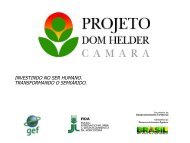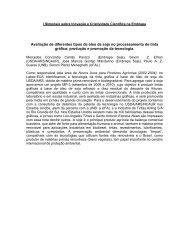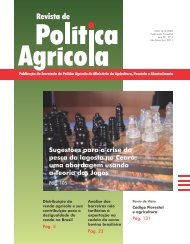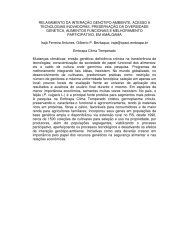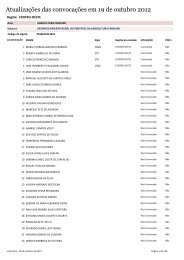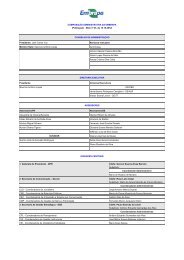Ministry of Agriculture, Livestock and Food Supply - Embrapa
Ministry of Agriculture, Livestock and Food Supply - Embrapa
Ministry of Agriculture, Livestock and Food Supply - Embrapa
Create successful ePaper yourself
Turn your PDF publications into a flip-book with our unique Google optimized e-Paper software.
possibility <strong>of</strong> increasing their overall agricultural production must also be taken<br />
into account19 .<br />
In the European Union changes in the sugar policy resulting from a recent<br />
decision <strong>of</strong> the World Trade Organization, together with internal budget pressures,<br />
have reduced expectations about future total sugar production. Even if the picture<br />
is modified after the incorporation <strong>of</strong> the Eastern European countries into the EU-<br />
25, sugar production is expected to decrease throughout Europe for two basic<br />
reasons: the high financial cost <strong>of</strong> sugar <strong>and</strong> alcohol production from beets <strong>and</strong><br />
the low energy consumption to energy production ratio for that crop.<br />
The international market is also adjusting to India's reduction <strong>of</strong> sugar sales,<br />
which was motivated by a forceful revision <strong>of</strong> its sugar policy <strong>and</strong> by sharp drops<br />
in sugar production in that country <strong>and</strong> in Thail<strong>and</strong>. Furthermore, both countries<br />
have ample possibilities <strong>of</strong> producing <strong>and</strong> using fuel alcohol, with the resultant<br />
decrease in sugar sales.<br />
These reductions <strong>of</strong> the sugar sales on the part <strong>of</strong> some <strong>of</strong> our main<br />
competitors occur when the Asian market is becoming increasingly dependent<br />
on foreign countries for the most part on account <strong>of</strong> increased per capita<br />
consumption <strong>and</strong> the urbanization phenomenon, particularly in China. According<br />
to specialists this additional dem<strong>and</strong> on the world supply could cause an increase<br />
<strong>of</strong> up to 10-million tons in additional sugar exports in the next 6-8 years.<br />
Thus, it is estimated that Brazil will be exporting 25-million tons p.a. in<br />
eight years, which added to a domestic consumption <strong>of</strong> approximately 11.5million<br />
tons, total 36.5-million tons <strong>of</strong> sugar. These numbers are very important<br />
because <strong>of</strong> the interrelation between alcohol <strong>and</strong> sugar; they also ascribe<br />
additional competitiveness to fuel ethanol.<br />
Although international alcohol sales are still small, they are growing<br />
rapidly. The strategic nature <strong>of</strong> the product, however, should bring about some<br />
degree <strong>of</strong> protectionism, which would make access to Brazilian alcohol sales<br />
more difficult <strong>and</strong> delay purchases from important countries or groups <strong>of</strong><br />
countries, such as the United States <strong>and</strong> the European Union, which will turn<br />
to domestic production before importing20 .<br />
19 In the European Union, the possibility <strong>of</strong> producing alcohol from beets, the need to change its sugar policy<br />
to comply with the OMS decision, <strong>and</strong> internal budget pressures concur to reduce estimated total sugar<br />
production in the future. Even if this picture were modified due to the incorporation <strong>of</strong> Eastern Europe<br />
countries into EU-25, the expected reduction would still be maintained for the whole Europe.<br />
2`0 Although the USA is the second largest alcohol producer in the world, its alcohol production is equivalent<br />
to only 3% <strong>of</strong> its gasoline consumption. Even so the expensive production <strong>of</strong> ethanol from corn is<br />
sufficiently protected to prevent imports from Brazil, although the Brazilian product is much more competitive.<br />
Something similar will probably occur in the European Union, as they cannot increase their agricultural<br />
production. The EU will have to make changes in some traditional production chains, such as those <strong>of</strong><br />
beets <strong>and</strong> wheat, in order to meet their commitments under the Kyoto Protocol.<br />
76


